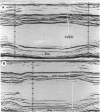Abstract
BACKGROUND--Clinical distinction between athlete's heart and hypertrophic cardiomyopathy in a trained athlete is often difficult. In an effort to identify variables that may aid in this differential diagnosis, the effects of deconditioning on left ventricular wall thickness were assessed in six highly trained elite athletes who had competed in rowing or canoeing at the 1988 Seoul Olympic Games. Each of these athletes showed substantial ventricular septal thickening associated with training (13-15 mm) which resembled that of hypertrophic cardiomyopathy. METHODS--The athletes voluntarily reduced their training substantially for 6-34 weeks (mean 13) after the Olympic competition. Echocardiography was performed at peak training and also after deconditioning, and cardiac dimensions were assessed blindly. RESULTS--Maximum ventricular septal thickness was 13.8 (0.9) mm in the trained state and 10.5 (0.5) in the deconditioned state (p < 0.005) (change 15-33%). CONCLUSIONS--The finding that deconditioning may be associated with a considerable reduction in ventricular septal thickness in elite athletes over short periods strongly suggests that these athletes had a physiological form of left ventricular hypertrophy induced by training. Such a reduction in wall thickness with deconditioning may help to distinguish between the physiological hypertrophy of athlete's heart and primary pathological hypertrophy (for example, hypertrophic cardiomyopathy) in selected athletes with increased left ventricular wall thickness.
Full text
PDF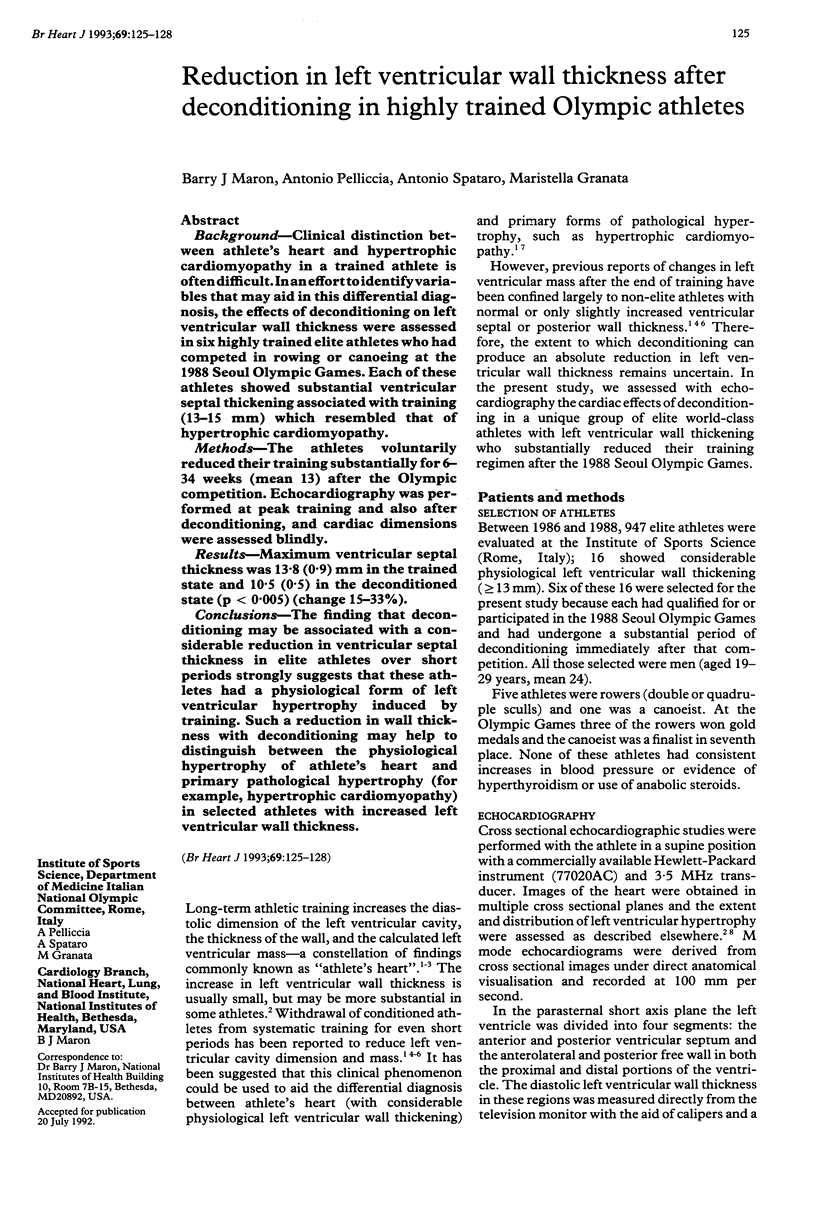
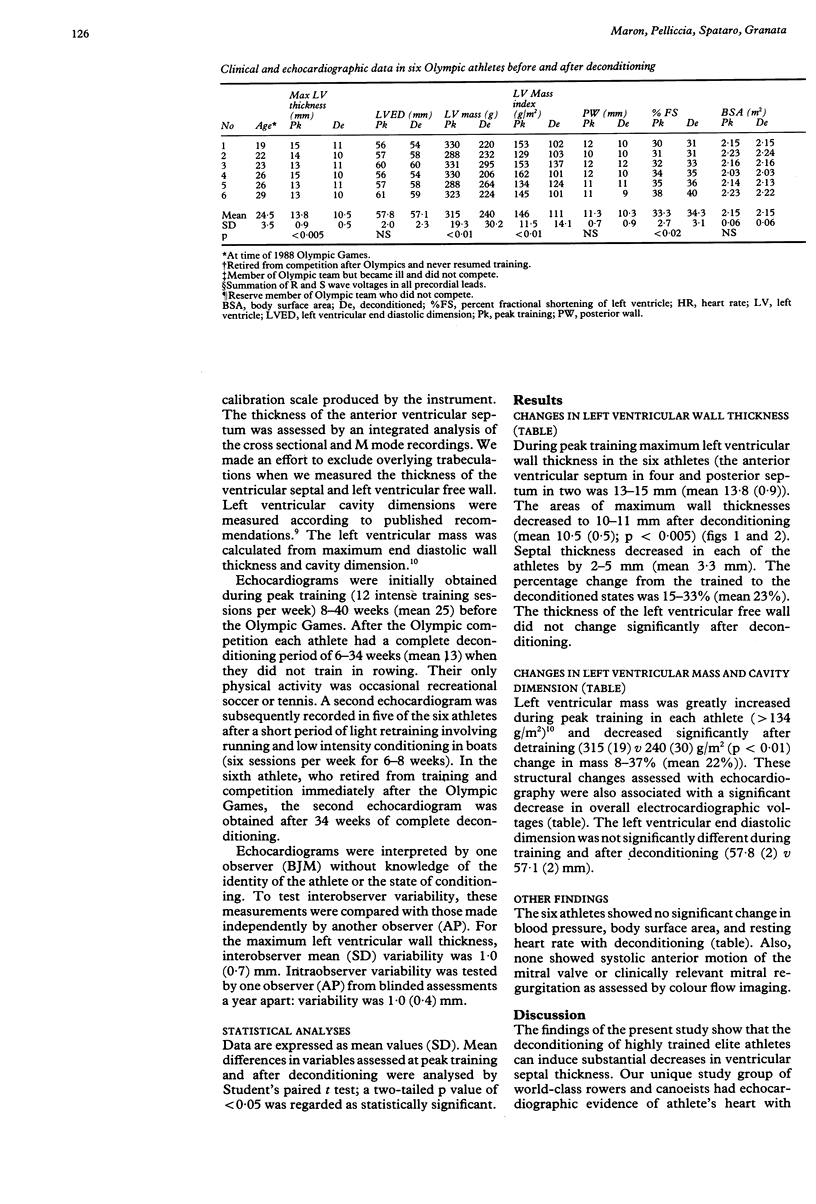
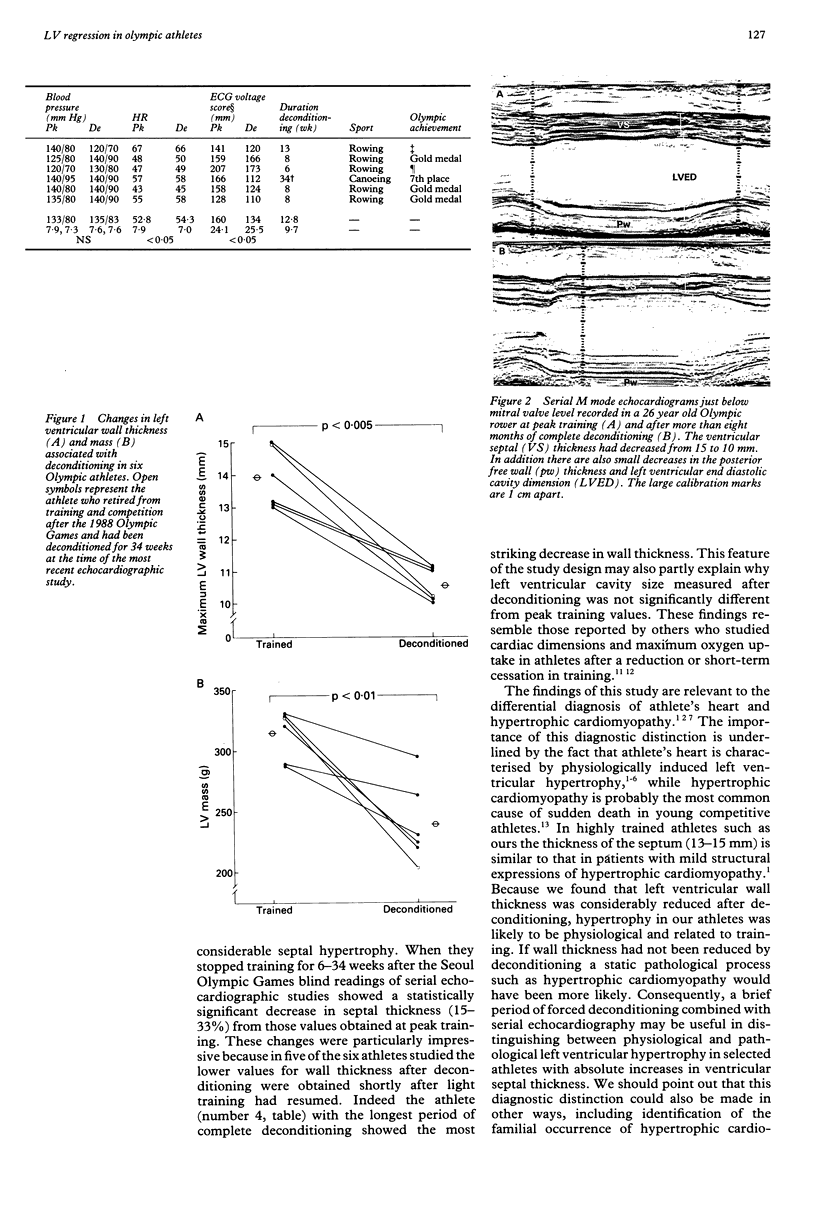
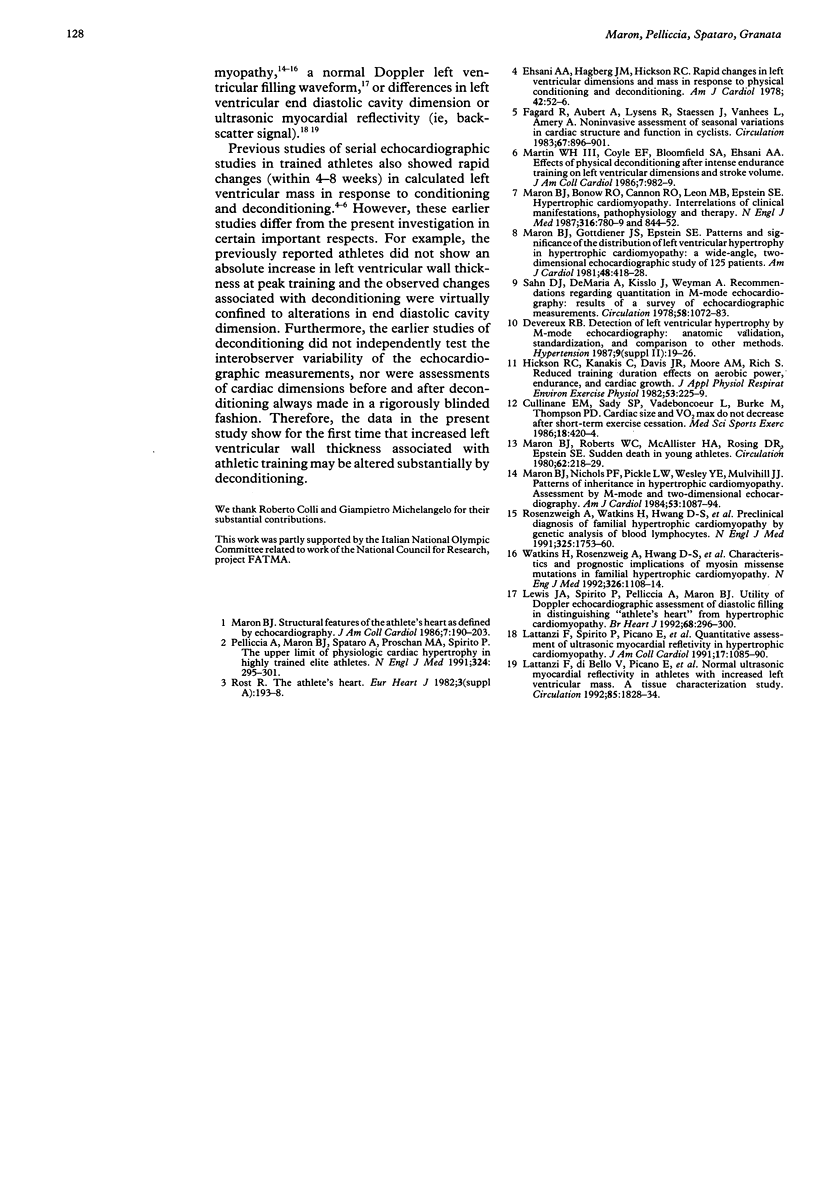
Images in this article
Selected References
These references are in PubMed. This may not be the complete list of references from this article.
- Cullinane E. M., Sady S. P., Vadeboncoeur L., Burke M., Thompson P. D. Cardiac size and VO2max do not decrease after short-term exercise cessation. Med Sci Sports Exerc. 1986 Aug;18(4):420–424. [PubMed] [Google Scholar]
- Ehsani A. A., Hagberg J. M., Hickson R. C. Rapid changes in left ventricular dimensions and mass in response to physical conditioning and deconditioning. Am J Cardiol. 1978 Jul;42(1):52–56. doi: 10.1016/0002-9149(78)90984-0. [DOI] [PubMed] [Google Scholar]
- Fagard R., Aubert A., Lysens R., Staessen J., Vanhees L., Amery A. Noninvasive assessment of seasonal variations in cardiac structure and function in cyclists. Circulation. 1983 Apr;67(4):896–901. doi: 10.1161/01.cir.67.4.896. [DOI] [PubMed] [Google Scholar]
- Hickson R. C., Kanakis C., Jr, Davis J. R., Moore A. M., Rich S. Reduced training duration effects on aerobic power, endurance, and cardiac growth. J Appl Physiol Respir Environ Exerc Physiol. 1982 Jul;53(1):225–229. doi: 10.1152/jappl.1982.53.1.225. [DOI] [PubMed] [Google Scholar]
- Lattanzi F., Di Bello V., Picano E., Caputo M. T., Talarico L., Di Muro C., Landini L., Santoro G., Giusti C., Distante A. Normal ultrasonic myocardial reflectivity in athletes with increased left ventricular mass. A tissue characterization study. Circulation. 1992 May;85(5):1828–1834. doi: 10.1161/01.cir.85.5.1828. [DOI] [PubMed] [Google Scholar]
- Lattanzi F., Spirito P., Picano E., Mazzarisi A., Landini L., Distante A., Vecchio C., L'Abbate A. Quantitative assessment of ultrasonic myocardial reflectivity in hypertrophic cardiomyopathy. J Am Coll Cardiol. 1991 Apr;17(5):1085–1090. doi: 10.1016/0735-1097(91)90836-x. [DOI] [PubMed] [Google Scholar]
- Lewis J. F., Spirito P., Pelliccia A., Maron B. J. Usefulness of Doppler echocardiographic assessment of diastolic filling in distinguishing "athlete's heart" from hypertrophic cardiomyopathy. Br Heart J. 1992 Sep;68(3):296–300. doi: 10.1136/hrt.68.9.296. [DOI] [PMC free article] [PubMed] [Google Scholar]
- Maron B. J., Bonow R. O., Cannon R. O., 3rd, Leon M. B., Epstein S. E. Hypertrophic cardiomyopathy. Interrelations of clinical manifestations, pathophysiology, and therapy (1). N Engl J Med. 1987 Mar 26;316(13):780–789. doi: 10.1056/NEJM198703263161305. [DOI] [PubMed] [Google Scholar]
- Maron B. J., Gottdiener J. S., Epstein S. E. Patterns and significance of distribution of left ventricular hypertrophy in hypertrophic cardiomyopathy. A wide angle, two dimensional echocardiographic study of 125 patients. Am J Cardiol. 1981 Sep;48(3):418–428. doi: 10.1016/0002-9149(81)90068-0. [DOI] [PubMed] [Google Scholar]
- Maron B. J., Nichols P. F., 3rd, Pickle L. W., Wesley Y. E., Mulvihill J. J. Patterns of inheritance in hypertrophic cardiomyopathy: assessment by M-mode and two-dimensional echocardiography. Am J Cardiol. 1984 Apr 1;53(8):1087–1094. doi: 10.1016/0002-9149(84)90643-x. [DOI] [PubMed] [Google Scholar]
- Maron B. J., Roberts W. C., McAllister H. A., Rosing D. R., Epstein S. E. Sudden death in young athletes. Circulation. 1980 Aug;62(2):218–229. doi: 10.1161/01.cir.62.2.218. [DOI] [PubMed] [Google Scholar]
- Maron B. J. Structural features of the athlete heart as defined by echocardiography. J Am Coll Cardiol. 1986 Jan;7(1):190–203. doi: 10.1016/s0735-1097(86)80282-0. [DOI] [PubMed] [Google Scholar]
- Martin W. H., 3rd, Coyle E. F., Bloomfield S. A., Ehsani A. A. Effects of physical deconditioning after intense endurance training on left ventricular dimensions and stroke volume. J Am Coll Cardiol. 1986 May;7(5):982–989. doi: 10.1016/s0735-1097(86)80215-7. [DOI] [PubMed] [Google Scholar]
- Pelliccia A., Maron B. J., Spataro A., Proschan M. A., Spirito P. The upper limit of physiologic cardiac hypertrophy in highly trained elite athletes. N Engl J Med. 1991 Jan 31;324(5):295–301. doi: 10.1056/NEJM199101313240504. [DOI] [PubMed] [Google Scholar]
- Rosenzweig A., Watkins H., Hwang D. S., Miri M., McKenna W., Traill T. A., Seidman J. G., Seidman C. E. Preclinical diagnosis of familial hypertrophic cardiomyopathy by genetic analysis of blood lymphocytes. N Engl J Med. 1991 Dec 19;325(25):1753–1760. doi: 10.1056/NEJM199112193252501. [DOI] [PubMed] [Google Scholar]
- Rost R. The athlete's heart. Eur Heart J. 1982 Apr;3 (Suppl A):193–198. doi: 10.1093/eurheartj/3.suppl_a.193. [DOI] [PubMed] [Google Scholar]
- Sahn D. J., DeMaria A., Kisslo J., Weyman A. Recommendations regarding quantitation in M-mode echocardiography: results of a survey of echocardiographic measurements. Circulation. 1978 Dec;58(6):1072–1083. doi: 10.1161/01.cir.58.6.1072. [DOI] [PubMed] [Google Scholar]
- Watkins H., Rosenzweig A., Hwang D. S., Levi T., McKenna W., Seidman C. E., Seidman J. G. Characteristics and prognostic implications of myosin missense mutations in familial hypertrophic cardiomyopathy. N Engl J Med. 1992 Apr 23;326(17):1108–1114. doi: 10.1056/NEJM199204233261703. [DOI] [PubMed] [Google Scholar]



